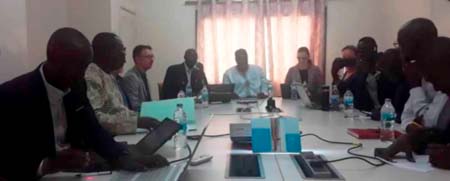
A
World Bank team led by Veronique Marie Morin Floissac and Ana Campos Garcia is
currently in the country to look at possibilities with regards to addressing
the issue of sea level rise in Banjul which is threatening all the economic
assets in Banjul.
The
process is led by National Disaster Management Agency (NDMA) as a risk agency.
Sometime
last year, NDMA requested through the World Bank requested assistance to
conduct a GIS mapping and surveillance about the Banjul sea level rise which
was authorised and approved.
The
team’s visit was a result of a follow up on National Disaster Management Agency
request regarding Banjul and KMC.
Studies
indicate that Banjul is among the highest risk cities in terms of sea level
rise in the world and if not addressed now can cause serious catastrophe.
The
objective of the mission is to meet with stakeholders and agree on a detailed
methodology, conduct field visits to the study areas, review data and survey
work.
It
will also conduct a multi-stakeholder workshop in partnership with a firm
selected to undertake the “Flood and Coastal Risk Assessment and Priority
Investment Planning for Greater Banjul” to gather data in support of delivery
of the activities, and provide support and training to the Kanifing Municipal
Council on drone imagery processing.
During
a meeting with the team at his office on Monday, NDMA Executive Director, Sanna
Dahaba said the purpose of the mission is to conduct a comprehensive study on
how stakeholders can collectively address the sea level rise in Banjul.
He
added that the GIS mapping and surveillance was conducted and the reports are
available and will be integrated into the current study which is being done by
Royal Happening DHV in Holland.
He
described Banjul as the economic hub of The Gambia, saying it is therefore
critical for stakeholders to come together and holistically put in measures to
address the issue of coastal erosion as well as all risk elements associated
with flooding in the country.
Ana
Campos Garcia, a senior disaster management specialist who is head of mission
said they feel the need of the government and want to work with them.
She
added that at the end of the mission they will provide recommendations and
possible solutions to the risk management.
According
to her, they also want to ensure that what they are doing is in line with
government priorities.
She
highlighted the importance of delivering the required information on time to
deliver the quality ‘we’ want.



